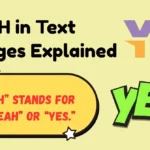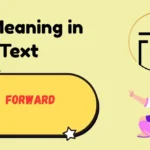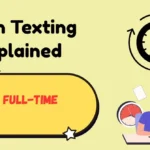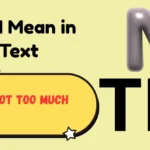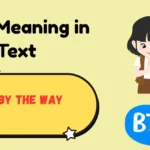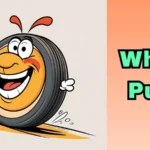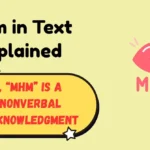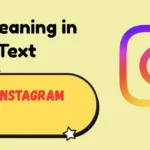Texting has changed the way we communicate. Short forms, abbreviations, and acronyms dominate our chats. One of the most common yet confusing ones is WTV.
You’ve probably seen it pop up in group chats, social media comments, or maybe in a heated conversation with a friend. At first glance, WTV looks harmless.
But depending on tone and context, it can either sound casual and flexible—or cold and dismissive.
This article digs deep into what WTV means in text, its tone, emotional subtext, professional alternatives, and how you can respond wisely.
Let’s break it down so you never misread (or misuse) WTV again.
What Does WTV Mean in Text?
WTV is shorthand for “whatever.” It’s most often used in texting, online chats, or casual conversations to express flexibility, indifference, or sometimes frustration.
For example:
- Friend 1: “Do you want pizza or burgers tonight?”
- Friend 2: “WTV, both sound good.”
Here, WTV simply means I don’t have a preference.
But in another situation:
- Friend 1: “I told you not to post that.”
- Friend 2: “WTV.”
This comes across as dismissive, possibly even rude.
Other contexts where WTV appears
Although texting slang dominates, WTV can also stand for other things in different contexts:
| Acronym | Meaning | Context |
|---|---|---|
| WTV | Whatever | Texting & casual chats |
| WTV | Windows Recorded TV Show File (.wtv) | Tech/file formats |
| WTV | World Television | Media/entertainment |
| WTV | We The Villains | Gaming groups/fandoms |
In texting, however, 99% of the time it simply means whatever.
The Tone Behind WTV
Unlike spoken conversation, text lacks body language and voice inflection. That’s why the tone of “WTV” can vary widely.
Common tones of WTV:
- Neutral: just showing flexibility.
- Dismissive: brushing off the conversation.
- Sarcastic: “whatever” with an eye-roll vibe.
- Frustrated: shutting down further discussion.
Tone often depends on punctuation and context:
- “WTV!” → enthusiastic, upbeat.
- “wtv.” → cold, frustrated, dismissive.
- “Wtv” → casual, flexible, neutral.
💡 Tip: Pay attention not only to the word but also to the flow of the conversation before assuming tone.
Why Tone Matters in Texting
Texting strips away facial expressions, voice tone, and body language—the very tools humans rely on to interpret meaning. That’s why a short reply like WTV can spark misinterpretation.
For example:
- In a friendly chat, “WTV” may mean I’m fine with anything.
- In an argument, it may mean I’m done talking.
Misreading tone can lead to unnecessary tension. In fact, a 2023 survey by Adobe showed that 43% of people admitted to misunderstanding tone in texts, leading to arguments or awkward silences.
Bottom line: In digital communication, clarity is key.
Is WTV Considered Rude?
The million-dollar question: Is saying WTV in text rude?
The answer: sometimes.
- Rude situations: during heated conversations, serious talks, or when someone expects a thoughtful response.
- Not rude situations: casual conversations, when both people understand each other’s texting style.
Generational difference
- Gen Z & Millennials: often see “WTV” as casual, neutral, even playful.
- Older generations: more likely to read it as dismissive or rude, since brevity can appear careless.
Case Study:
Sarah, a 32-year-old marketing manager, once replied “WTV” in a team group chat when asked about meeting snacks. While she meant “I’m fine with anything,” her boss took it as dismissive. That moment taught her to avoid abbreviations in professional settings.
Emotional Subtexts of WTV
When you see “WTV,” don’t just take it literally. There’s often an emotional subtext behind it.
Possible meanings:
- Indifference – “I genuinely don’t care either way.”
- Frustration – “I’m annoyed, and I don’t want to talk about it.”
- Sarcasm – “Yeah, whatever…” with a dismissive undertone.
- Agreement – “I’m okay with anything, you decide.”
Think of “WTV” as a chameleon. It changes its shade depending on the conversation.
When to Avoid Using WTV
Not every situation is right for WTV. Some contexts call for more clarity and respect.
Avoid using WTV when:
- Messaging your boss or colleagues in professional settings.
- Responding during an emotional argument.
- Talking with someone who’s already upset.
- Chatting with people who aren’t familiar with texting abbreviations.
Instead of risking misinterpretation, go with clear, thoughtful phrasing.
Polite & Professional Alternatives to WTV
If you want to keep your response light but still avoid misunderstandings, here are better alternatives to WTV, grouped for different situations.
Friendly Casual Alternatives
- “I’m good with either option.”
- “Anything works for me.”
- “I don’t mind—your call.”
Professional & Polite Alternatives
- “I’m flexible—go with what’s best.”
- “I’m okay with whichever you choose.”
- “I trust your judgment on this.”
Warm & Supportive Alternatives
- “Let’s go with what feels right.”
- “Either option works—I’m easy.”
- “I’ll go with your decision on this one.”
💡 Using alternatives not only prevents miscommunication but also makes you sound more thoughtful and emotionally intelligent.
How to Respond When Someone Texts WTV
Knowing how to respond depends on the tone you sense.
If casual/light:
- “Haha, alright, I’ll pick then.”
- “Cool, thanks for letting me choose.”
If it feels cold/frustrated:
- “Sounds like you’re upset. Do you want to talk about it?”
- “I’m not sure if you’re okay with this—want to clarify?”
If unsure:
- “Just checking—did you mean you’re fine with anything, or do you have a preference?”
Quote:
“The single biggest problem in communication is the illusion that it has taken place.” – George Bernard Shaw
This applies perfectly to “WTV.” Don’t assume—ask.
Politeness & Clarity in Modern Texting
Politeness and clarity go a long way in building trust. With texting, short forms may save time but often at the cost of warmth.
Think of texting like email: you wouldn’t end a professional email with just “whatever.” In the same way, choose words that match your intention and respect the other person’s feelings.
Benefits of clarity in texting:
- Prevents misunderstandings.
- Strengthens relationships.
- Reduces unnecessary arguments.
Cultural & Generational Context
Texting slang like WTV isn’t universal. Culture and generation heavily influence interpretation.
Generational breakdown:
- Teens & early 20s (Gen Z): Comfortable with abbreviations; use WTV casually.
- Millennials: Understand it but often prefer alternatives in professional settings.
- Older generations: May misread it as rude, abrupt, or lazy.
Cultural differences:
- Western cultures: brevity is often fine in casual texts.
- Asian cultures: politeness is highly valued, so “WTV” might feel disrespectful.
Table: Perceptions of WTV Across Generations
| Group | Likely Interpretation |
|---|---|
| Gen Z | Neutral, casual |
| Millennials | Depends on context |
| Gen X & Boomers | Often rude or dismissive |
FAQs
What does WTV mean in text messages?
WTV stands for “whatever” and is usually used in casual chats to show flexibility, indifference, or sometimes frustration.
Is WTV rude to say in texting?
It depends on tone and context. In light chats it’s fine, but in serious or heated conversations it can sound dismissive.
How can I respond when someone texts WTV?
If it feels casual, pick an option and move on. If it seems cold or frustrated, ask for clarification to avoid miscommunication.
What are polite alternatives to WTV?
Some options include: “I’m good with either option,” “Anything works for me,” or “I trust your judgment.”
Should I use WTV in professional texts or emails?
No. It’s best to avoid abbreviations like WTV in professional communication. Use polite, clear alternatives instead.
Do different generations interpret WTV differently?
Yes. Gen Z often sees it as casual, while older generations may view it as abrupt or rude.
Conclusion
At the end of the day, WTV in text is just shorthand for “whatever.” But it carries more weight than the three letters suggest. Depending on tone, punctuation, and context, it can come across as flexible, indifferent, or downright rude.
Instead of defaulting to “WTV,” upgrade your texting with emotional intelligence. Use polite alternatives when needed, clarify when you’re unsure, and remember that clarity builds stronger connections than shortcuts ever will.
So next time you’re tempted to type “WTV”, ask yourself: Will this be clear, or could it be misread?
Because in the world of texting, a little extra thought goes a long way.

